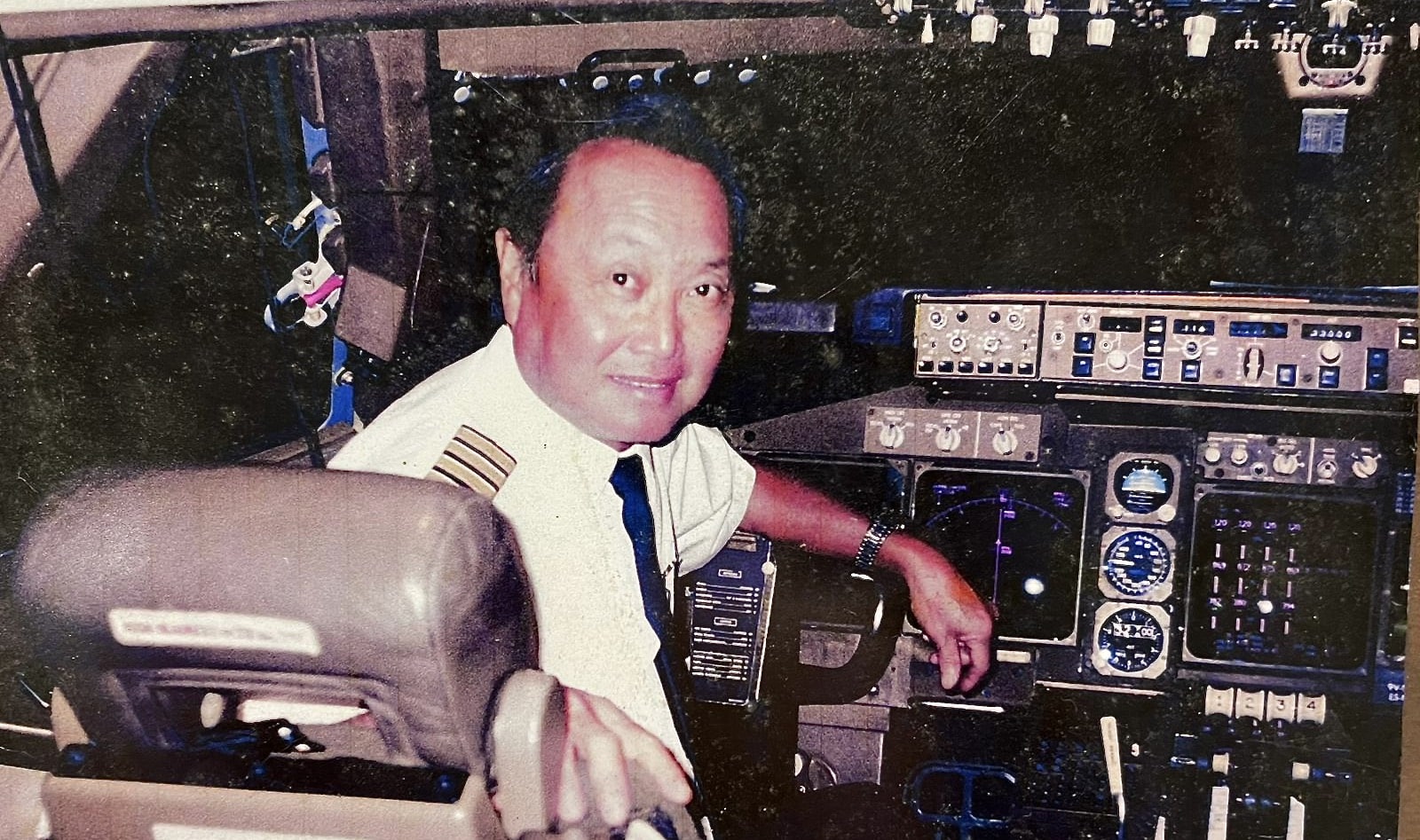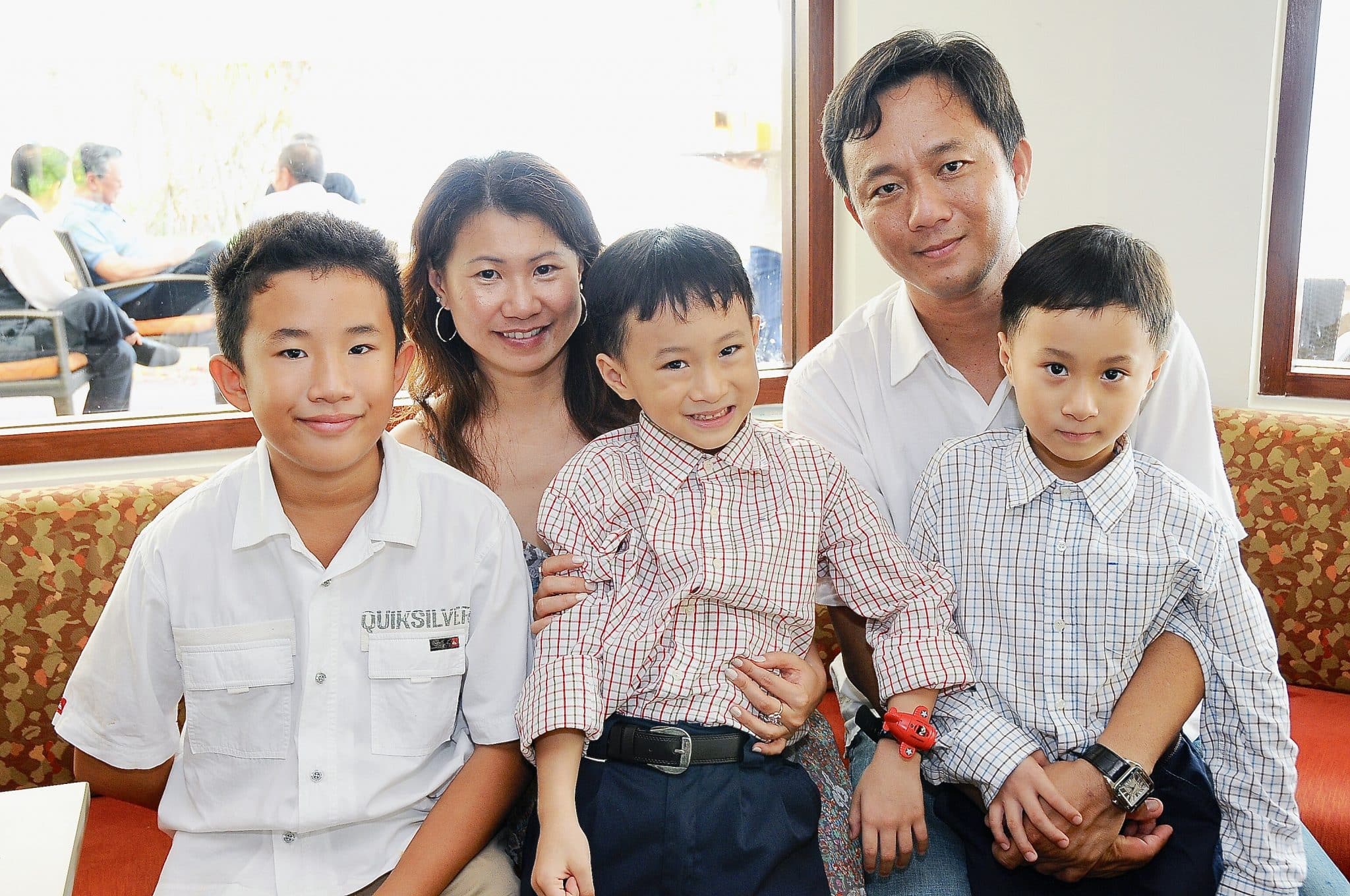From selling rojak to flipping cars in the US, he now has a start-up that helps people live their dreams
by Christine Leow // September 8, 2022, 7:20 pm
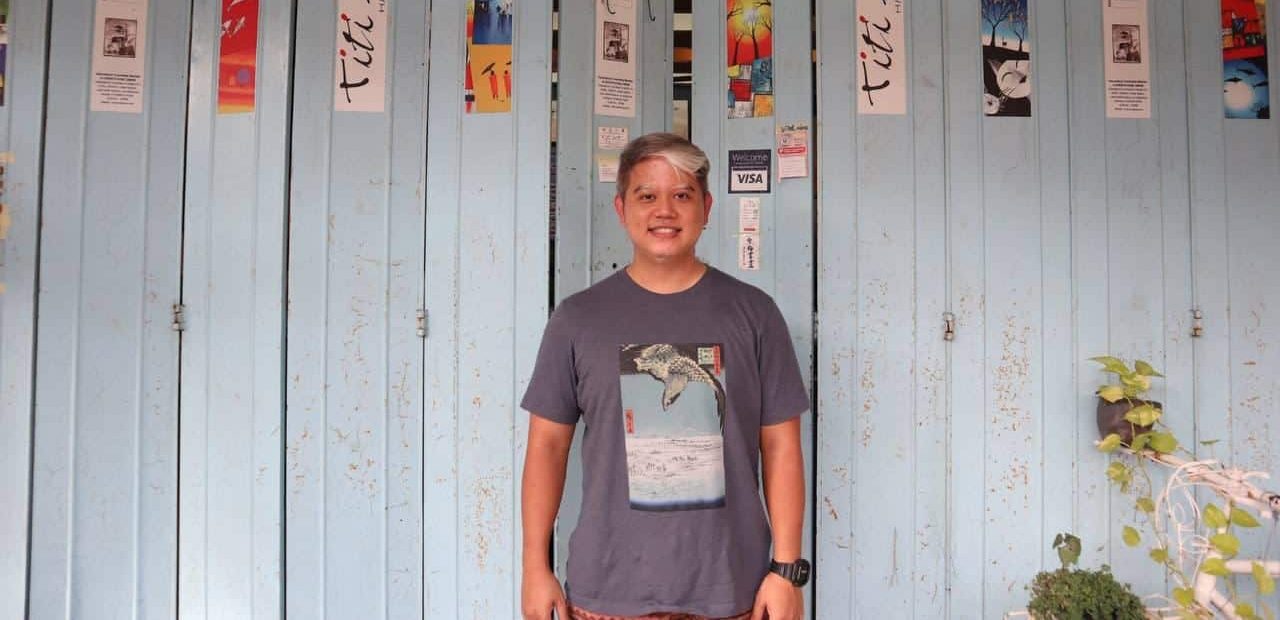
What makes a person dream? Why do we desire things? Caleb Leong and his cousin Jabez found that "it is ingrained in people to have visions. Proverbs 29:18 says that ‘where there is no vision, the people perish". From this insight came Dreamfect, a social media app that helps people fulfil their dreams. All photos courtesy of Caleb Leong.
Caleb Leong is all of 31 but he has already had a diverse career.
While still in secondary school, he bought guitar strings online from a distributor and resold them to his friends for a profit.
As a polytechnic student, he bought over a rojak (Asian salad) and popiah (spring roll) stall and ran it with a cousin. His plan was to do well enough to hire workers for the stall and then to open a chain of rojak stalls. He had to quit the business when he started serving National Service (NS) and could not scale up the business fast enough to work on it remotely.
When he was studying in the US, he bought and sold cars to supplement his allowance.
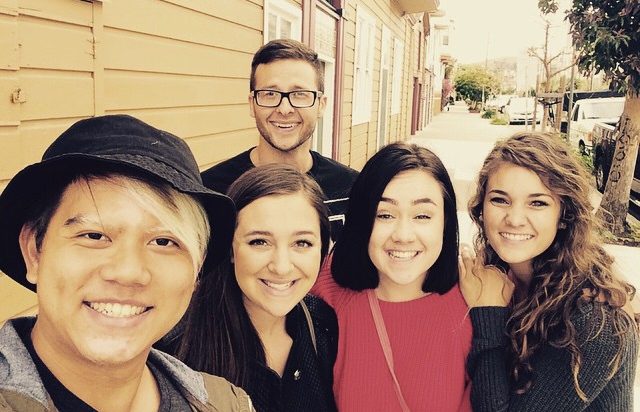
Caleb (left) with friends in the US. While there to study at a ministry training centre, he made extra pocket money by buying and selling cars.
“Within a year or two, people came to know that if you want to have a car, you go to Caleb. They would ask me questions about owning cars. I became their version of LTA (Land Transport Authority)!” he told Salt&Light with a chuckle.
Being with other Kingdom-minded entrepreneurs helped Caleb fine-tune his idea of a redemptive business.
“The entrepreneurial side of me was something I always had. I see it as an opportunity to take what I have and to make more from it.”
Now, he and another cousin, Jabez Leong, are about to launch Dreamfect, the world’s first social media app to help people realise their dreams.
“There are platforms for people to sell cars, for finance, to make friends. Why not one to encourage people’s dreams?
“Romans 8 tells us that we are made for greatness. When a child of God finds himself through God, he finds something that the world has yet to see.”
Despite his confidence as an entrepreneur, this start-up co-founder had an uneasy start in life.
Bullied for being different
Caleb was born with piebaldism, a rare hereditary disorder of pigmentation characterised by patchy white skin and white hair. It was apparent from birth.
“But when I was younger, I didn’t realise my condition. I just thought: No choice, I’m special because Mum just said, ‘You are special. You are different.’”

Caleb was diagnosed with piebaldism from birth. The condition results in light patches of skin and hair.
Now, with some of his light hair streaked dark, Caleb gives off a trendy youth pastor vibe. But as a child, standing out so visibly made him an easy target for bullies.
“In primary school, I was physically bullied. The boys kicked me, punched me, pinched me. They called me ‘cow’, ‘dalmatian’ because my legs were brown and white.”
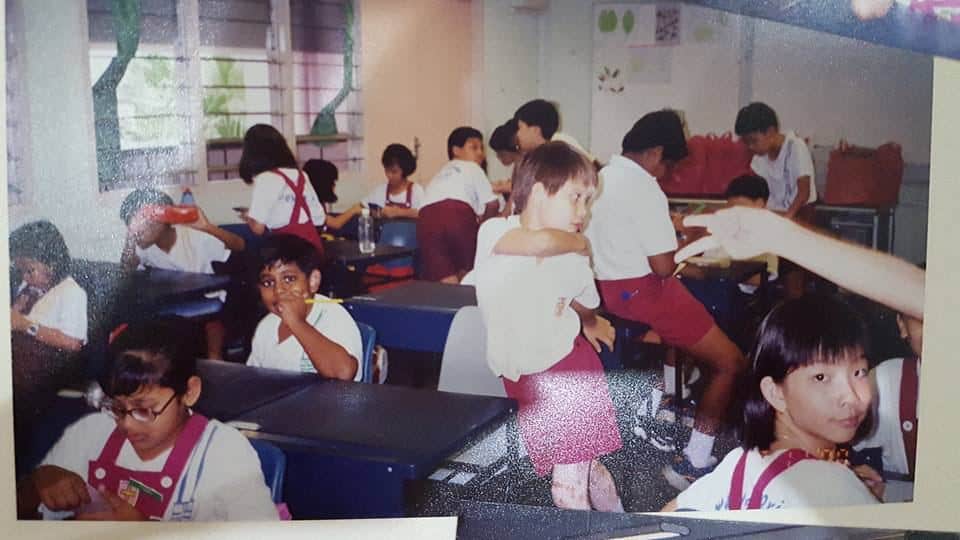
Though bullied because he was different, Caleb (centre) admitted that he was not timid. Instead, as a child, he was quite mischievous.
But he was no cowering victim. Caleb’s adventurous spirit was evident even as a child.
“I was mischievous. I was never diagnosed with ADHD but I think I was because I couldn’t pay attention, moved around a lot.”
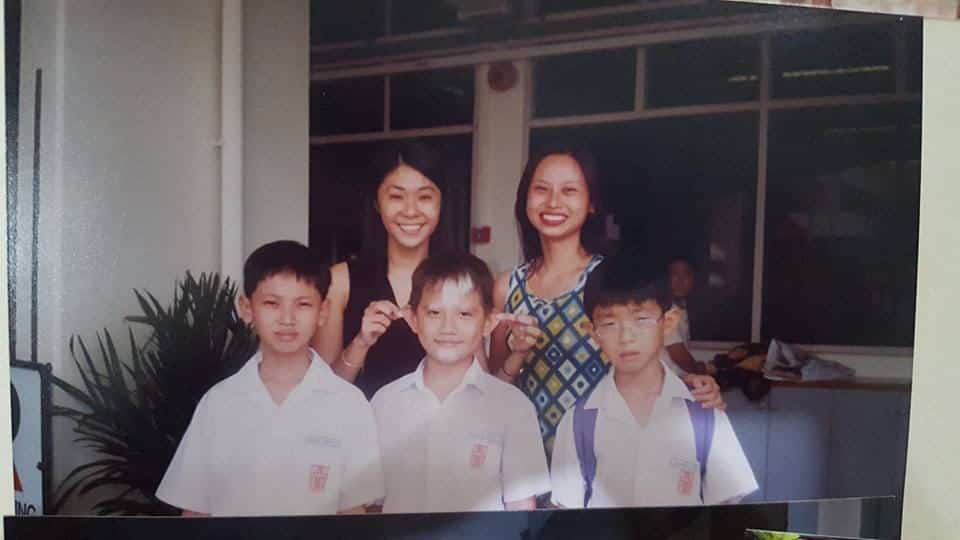
Caleb (centre) with his classmates and his teacher Veronica Ng (standing, right).
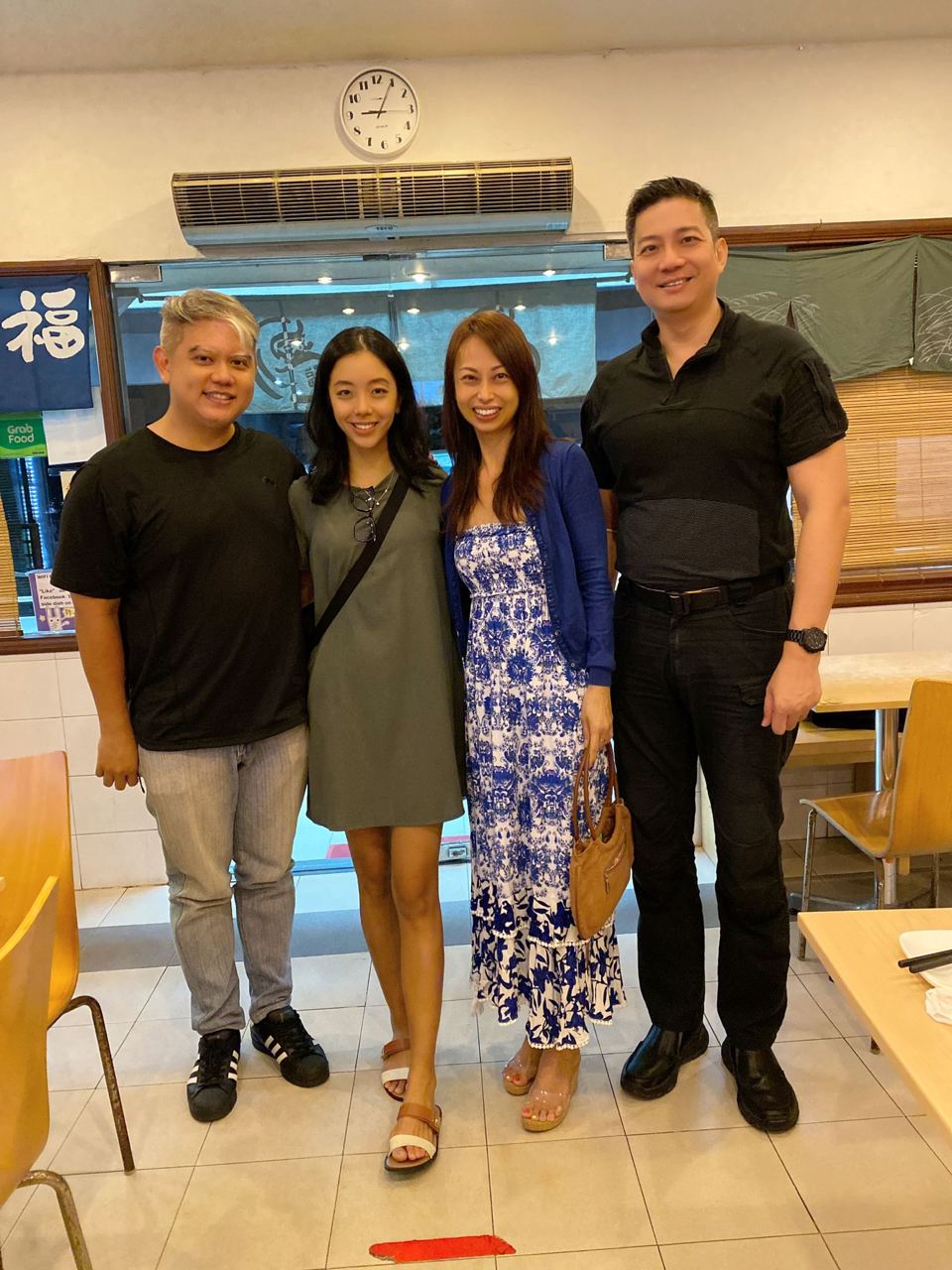
Caleb (left) with his wife Rachel and his former teacher, Veronica Ng, with whom he has kept in touch, and her husband Matthew Yap.
His father, a pastor, was a strict disciplinarian and because Caleb was “naughty and very rebellious”, they had an uneasy relationship.
“When I did something wrong, he would take out the cane. I wouldn’t run. I would just go up to him and ask him to get it over with. So, I grew up getting caned. I was also scolded a lot.”
Father’s faith, mother’s drive
By secondary school, Caleb had become a little bit of a rascal.
Months shy of taking his ‘O’ level examinations, he was publicly caned in school and suspended for four months for rioting in school. As a result, he fared poorly in the national examination.
“I barely scraped through. My grades were so bad that I could only make it to a few polytechnics.”
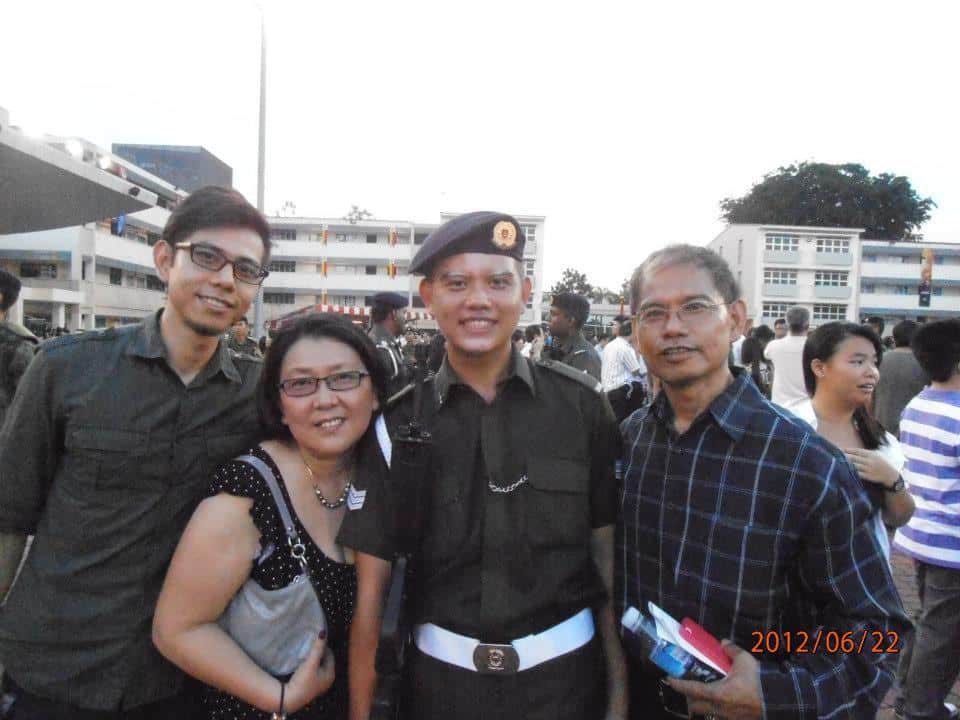
Caleb (second from right) with his brother, mother and father.
His father was “so patient” with him, acknowledged Caleb.
“Mum was very adventurous. I picked this up from Mum’s side.”
“Dad was like, ‘What do you want to do?’ I wanted to do music. He said, ‘Okay. This is what you want to do, I want to support you because it is something you know and something you love.’
“He was strict in moral values and integrity. But in terms of what we love, what we want to do, he trusted God. His faith in God is just amazing.”
Caleb never did pursue a career in music, opting instead to continue his studies at a polytechnic. But his father’s unflinching support healed the rift between them.
His mother shaped him in a different way.
“Mum was very adventurous. She was willing to take risks. I picked this up from Mum’s side,” Caleb said.

Caleb (left) with his wife and family: (Left to right) nephew, father, his mother who passed away in 2018 from cancer, brother-in-law, sister with her second child, brother, brother’s mother-in-law and brother’s wife.
She partnered Caleb’s father in his ministry in church and, although she did not finish secondary school, started her own interior design company.
When his mum passed away from cancer, hundreds of people from different walks of life attended her wake.
An active volunteer, she helped out at the Singapore Association of the Visually Handicapped (SAVH) and organised a first-ever cycling trip for them from Singapore to Malaysia.
Explained Caleb: “In those days, if you are blind, you stay home. But she wanted them to experience life and brought them to Kota Tinggi to experience the waterfall. I went with her as a kid.”
His mother also reached out to nurses living in the dormitory.
“She only knew how to play four guitar chords but she offered them free guitar lesson. Over 20 nurses became Christians as a result of her friendship. One even became like a foster sister.”
His mother even started an orphanage in India even though she had no experience in the area.
When she passed away from cancer in 2018, hundreds of people from different walks of life attended her wake, a testament to the lives she had touched.
First faith encounter
Having been raised as a Christian, Caleb has always known that God is real.
“I used to write letters to God, fold them into aeroplanes and throw them out of the window.”
“My dreams were shattered. At one time, I even questioned if God existed.”
But as he grew up, going to church became just a family routine to him. It was while he served NS that he had a personal encounter with God.
Caleb had dreams of being a fighter pilot and had been shortlisted for the course in the army. Multiple tests and hours of rigorous training later, he went to Australia for his aerial grading course. He failed.
“My dreams were shattered. At one time, I even questioned if God existed.”
By then, his older sister had moved out of the family home and they did not speak much. But when she found out that he had not made the cut, she called him.
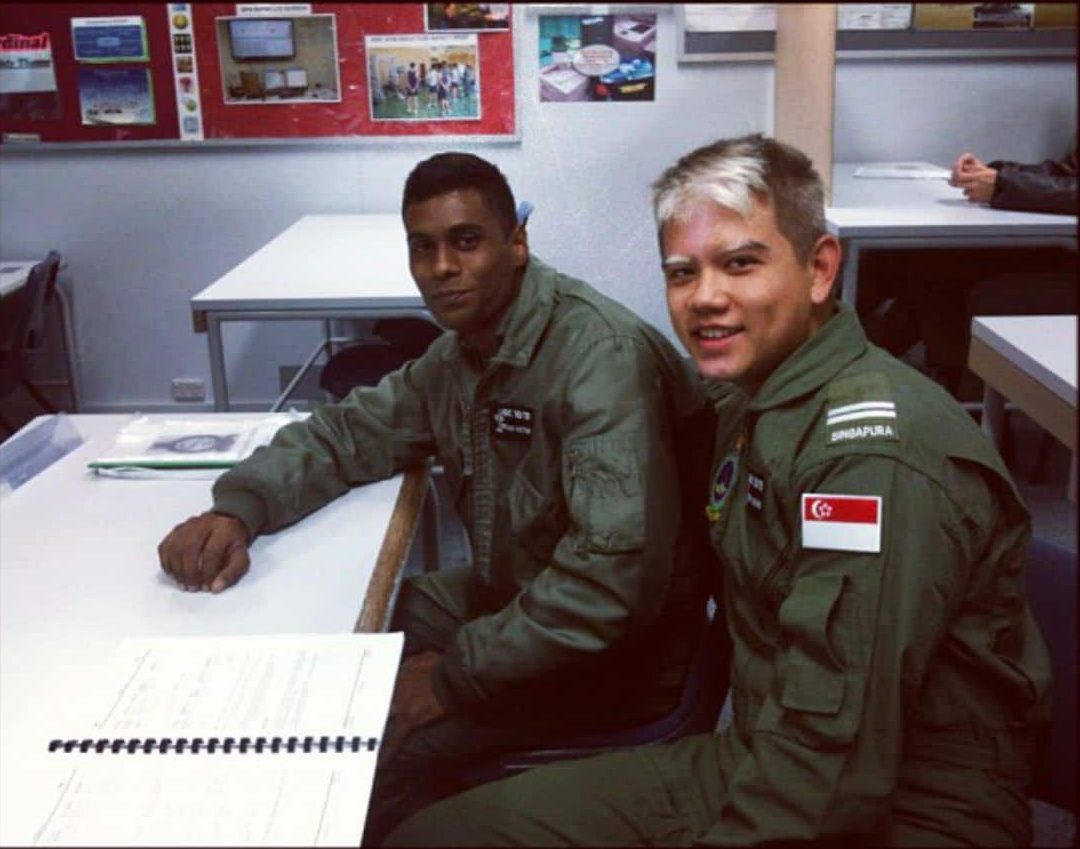
It was Caleb’s dream to become a fighter pilot. But failing his aerial grading course opened doors for him to go to the US instead to study at a ministry training centre.
“She told me that she loves me and God loves me. Then she said, ‘Why do you think God doesn’t exist? He has a better plan for you. I don’t want you to give up hope.’
“It came out of the blue. I hadn’t shared much with her. I remember crying, and I just felt the love of God and the peace of God enter me.”
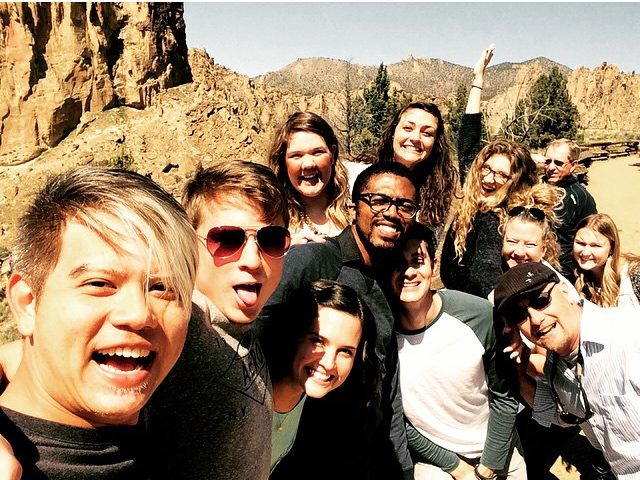
Caleb with his friends in the US where his sister sponsored him to study at a ministry training centre.
Two days later, Caleb’s sister offered him the money she had been saving for her first child. She and her husband were not well to do but she wanted him to have the money to go to a Christian ministry training centre abroad.
“It broke me,” said Caleb. “Why are you even doing this? I don’t even deserve it.”
He took up her offer and went to the US. After three years of learning and growing in his faith, he returned to take a job with a car distributor.
Dream a little dream
While Caleb was studying abroad, he kept in touch with his cousin Jabez over Skype every week.
During one conversation, Jabez’s wife mused out loud that it would be wonderful to have a social media app for dreams. The seed of an idea for a place to “share dreams and connect with one another” was planted. That was in 2016.
“We didn’t know where to start. We didn’t know how to move ahead.”
“When you express your dream, it creates momentum and space for others to come in and speak into your life.”
Even as both cousins went on to forge separate careers – Caleb in the motoring business and Jabez in artificial intelligence – they never forgot their idea.
“We talked about it for some time. Then we took time to think: What makes a person dream? Why do we desire things? Why is there this aspect of wanting to achieve?
“We looked into the different theories and found that it is ingrained in people to have visions. Proverbs 29:18 says that ‘where there is no vision, the people perish’. It’s in our DNA to see and have that vision.”
In their research, they also realised that procrastination is the biggest obstacle to realising dreams. Most dreams never come to pass because of three factors: Fear of failure, enormity of the scale and size of the dream, and lack of support.
“It is proven that if you feel accountable and you put a deadline to it, the chance of success goes up to 72%. When you express your dream, because you already said that you would do it, it creates momentum and space for others to come in and speak into your life.”
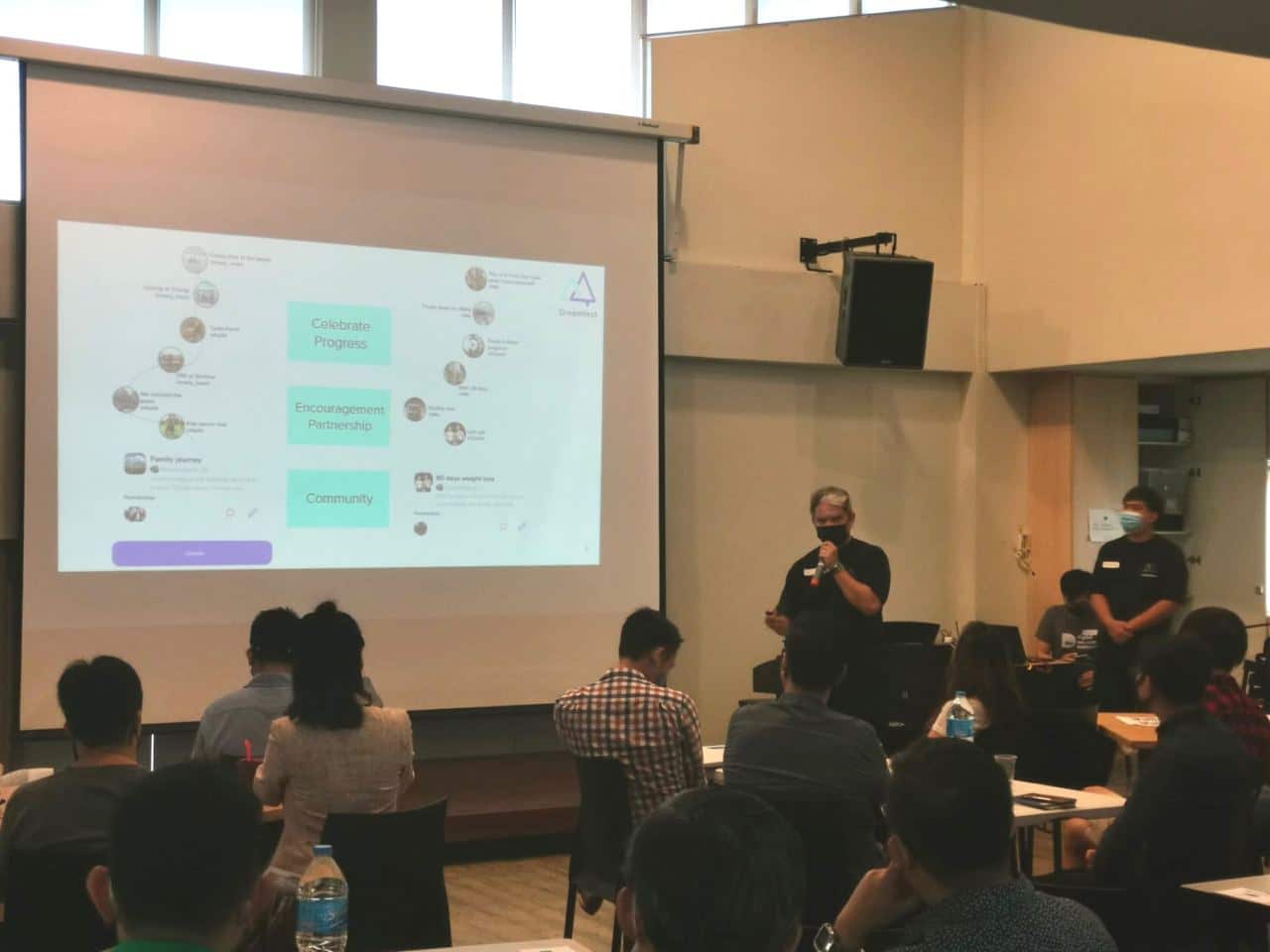
Caleb and Jabez (standing, right) came up with the idea of a social media platform to encourage people to fulfill their dreams because they wanted to change the negativity of social media.
In 2020, the pair began to pursue their dream in earnest and the seed of an idea blossomed into Dreamfect, a social media app to help people document and complete their personal goals and projects. They applied for the Startup SG Founder grant and got it. This year, Caleb quit his job to concentrate on Dreamfect full time.
“We want to build a culture of hope. I want people to believe there is a chance. When a person sees the vision of what they want to do, the chance of fulfilling it increases even in the face of pain or tough times.
“As people explore their passions and dreams, they get to see who God created them to be. In that process, they find hope and God.”
A culture of hope
Dreamfect works by having users go to the platform, create their profile and post their dreams – whether it is a personal project or goal.
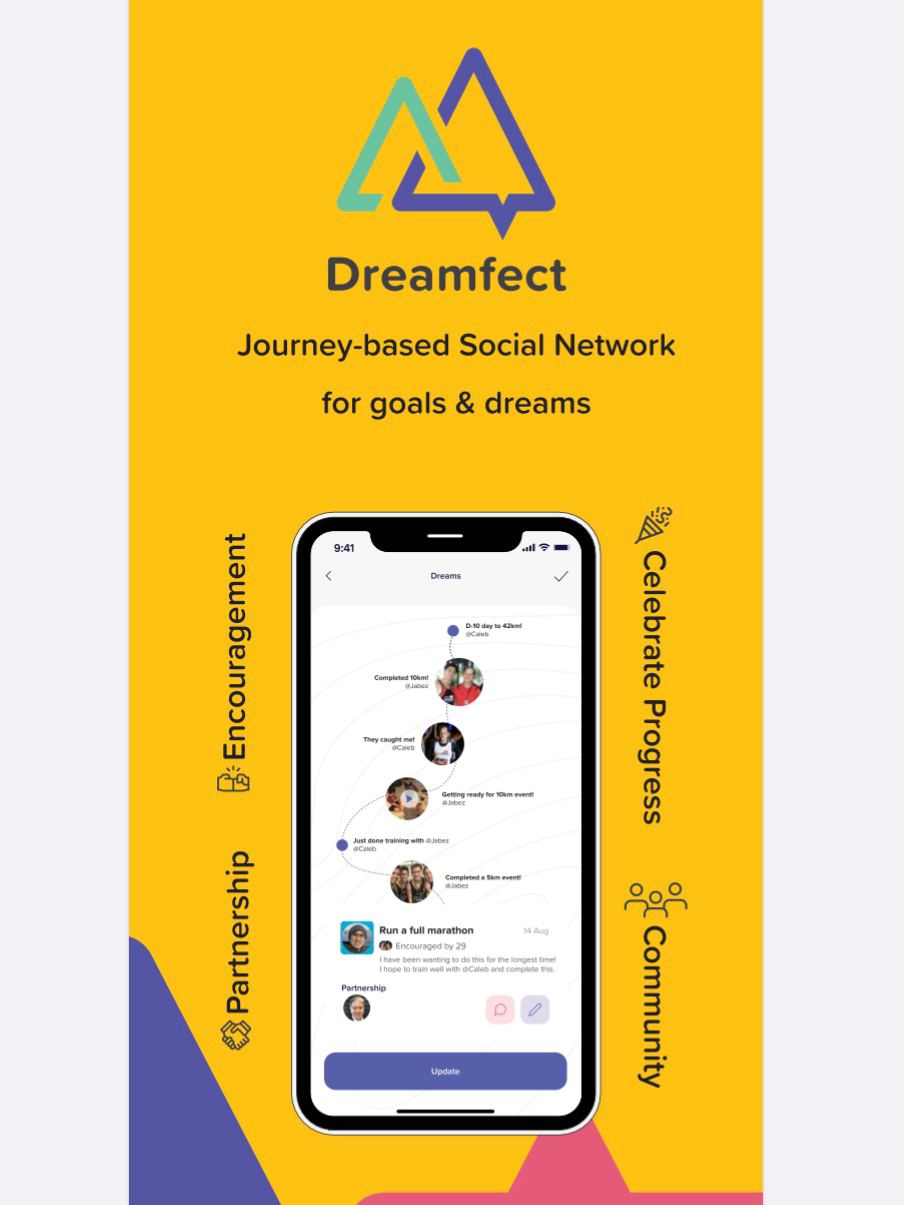
Dreamfect allows people to pen their dreams and chart their path to making them real.
“People’s dreams are very powerful.
“Some people put their family journey as a goal. They may say, ‘My dream is to have a good family.’ Then, they can post family outings and you can see how the child grows up in the next two to three years.
“We want to create a culture of hope that is a meaningful alternative to the social networks we see today.”
“You can say, ‘My dream is to cycle around East Coast Park.’ Then you put your friends in and you can update each other. People can encourage you, support you, tell you, ‘I am here for you. You can make it happen!’
“It can be anything from exercising to losing weight to finishing a book a month. If you want to learn to play the guitar, you can find someone who has learnt it and see his progress.
“It gives people’s dreams visibility, and they and others can be inspired by it. It creates space for people to be encouraged and to encourage others.”
The app looks set to become a reality for Caleb and Jabez. They recently closed the pre-seed round and the social media platform is in its alpha stage with some 100 users.
Even as Caleb courted investors, he learnt precious lessons. Ever the consummate salesman, he had gone into his LinkedIn account and messaged everyone he knew when he was raising support.
“But I felt God say, ‘Can you trust Me? Is this your company or Mine?’”
So, instead of focusing on the funds, Caleb has had to learn to “have a heart posture of trusting him and not striving”. When he rested in God, the investors came, one after another, all through recommendations.
“I felt God say, ‘Can you trust Me? Is this your company or Mine?’”
“They were all angel investors. We raised S$100,000 from angel investors. All are Christians.”
By next year, they hope to have up to 10,000 users.
“By then, we would have product market fit and data to see why and how Dreamfect is growing.
“Ultimately, we want to create a culture where people celebrate progress and not the end result. We want to create a culture of hope that is a meaningful alternative to the social networks we see today.”
Dreamfect made it into Digital Mission Ventures. The accelerator and capital provider builds Southeast Asia’s redemptive technology ecosystem by growing a community of founders, funders, mentors, and partners.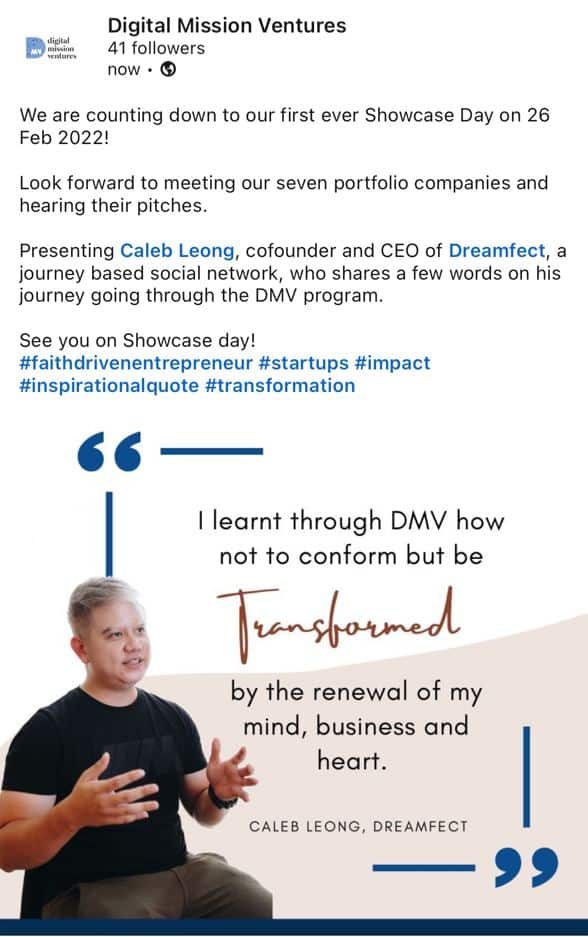
Being a part of DMV Labs gave Caleb a chance to meet Kingdom-minded entrepreneurs interested in furthering the work of the Gospel and not merely in making a profit.
Being with other Kingdom-minded entrepreneurs helped Caleb fine-tune his idea of a redemptive business.
“Instead of asking, ‘Where’s the money?’, DMV helped us to focus on what truly matters: What are you building the business for? Where are the redemptive aspects of the business?
“We had a strong redemptive idea but we had to learn how to build an encouraging culture in the work space, how to create a company that glorifies God.
“Without God, we won’t be where we are. The idea came from God.”
Check out DMV if you want to find out how you can be invovled in helping missional digital start-ups.
RELATED STORIES:
New co-working space is looking for the next Facebook to disrupt how we do missions
Local start-up Jaga-Me sees Singapore as an Antioch of entrepreneurs
We are an independent, non-profit organisation that relies on the generosity of our readers, such as yourself, to continue serving the kingdom. Every dollar donated goes directly back into our editorial coverage.
Would you consider partnering with us in our kingdom work by supporting us financially, either as a one-off donation, or a recurring pledge?
Support Salt&Light